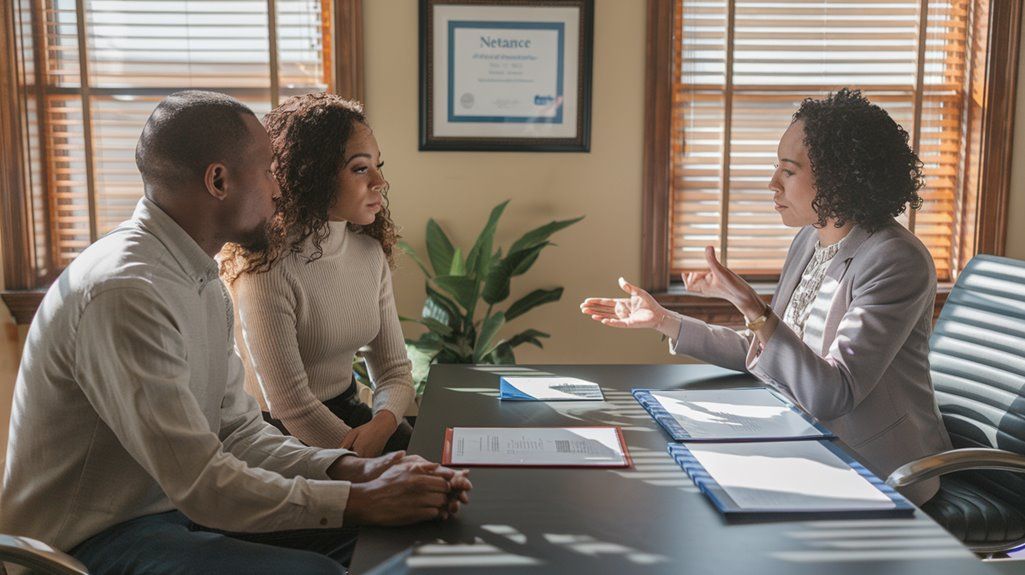Which Professionals Are Qualified to Offer Child Counseling and Why?
Share this article:

Navigating your child's emotional and behavioral challenges can feel daunting, but you're not alone. Child psychologists, licensed counselors, pediatric therapists, school counselors, and clinical social workers are all equipped to offer support. Each brings a unique expertise: from understanding developmental stages, employing play and cognitive-behavioral techniques, to providing holistic and practical strategies for resilience. They create safe spaces for your child to explore feelings, overcome trauma, and build coping mechanisms. Understanding the specific strengths of each professional can guide you towards the right support. There's much to discover about how these experts can contribute to your child's well-being.
Listen to the Article
Key Takeaways
- Child Psychologists are qualified due to their expertise in developmental psychology and therapeutic techniques tailored for children.
- Licensed Counselors provide specialized support with a focus on therapeutic interventions for behavioral challenges and trauma recovery in children.
- Pediatric Therapists use age-appropriate methods like play therapy and cognitive-behavioral approaches to address children's mental health issues effectively.
- School Counselors are equipped to identify and address emotional and academic challenges, fostering a supportive environment within educational settings.
- Clinical Social Workers offer a holistic assessment of a child's needs within their family and community, advocating and connecting them to resources.
Understanding Child Psychologists
Child psychologists are crucial in understanding and addressing the complex emotional and behavioral needs of children, guiding them through their formative years with expertise and empathy. They're not just professionals; they're passionate advocates for children's mental health, dedicating their careers to ensuring young individuals can navigate the challenges of growing up with confidence and support.
You might wonder what makes child psychologists uniquely qualified for this delicate task. It's their deep understanding of developmental psychology, coupled with rigorous training in therapeutic techniques specifically designed for children. They're adept at creating a safe, welcoming environment where children feel heard and understood, a space where healing and growth can occur.
Their approach is both science-based and heart-led, blending evidence-based practices with an innate sensitivity to the emotional language of children. By employing play therapy, cognitive-behavioral techniques, and family counseling, they tailor their methods to each child's specific needs, ensuring no one size fits all.
In essence, child psychologists embody the blend of knowledge, compassion, and skill needed to make a profound difference in a child's life. For those drawn to serving the youngest among us, understanding and appreciating the role of child psychologists is the first step towards making a meaningful impact.
The Role of Licensed Counselors
Licensed counselors play a pivotal role in shaping the mental health landscape for children, offering specialized support that complements the work of child psychologists. You'll find that these professionals aren't just a fallback option but are integral in providing holistic care. They're trained to navigate the complex emotional and psychological needs of children, employing strategies that foster resilience and healthy coping mechanisms.
You might wonder how they differ from child psychologists. Well, licensed counselors focus on therapeutic interventions that address a wide range of issues, from behavioral challenges to trauma recovery, without necessarily delving deep into psychiatric diagnoses. Their approach is often more hands-on and practical, involving the child in activities or discussions that aid in their recovery and development.
It's essential to recognize the unique contribution licensed counselors make. They bridge the gap between the child's experiences and the therapeutic outcomes desired, using empathy and expert knowledge to guide their young clients towards a brighter, more stable future. For those of you looking to serve others, understanding the pivotal role of licensed counselors in child mental health is crucial. They're not just counselors; they're advocates, educators, and crucial allies in the journey towards healing and growth.
Pediatric Therapists Explained
Pediatric therapists specialize in tailoring their approach to meet the unique developmental needs of younger patients, ensuring therapy is both effective and engaging. They're not just therapists; they're empathetic guides who understand the intricate world of child development. You see, children aren't just small adults. Their minds process information, emotions, and trauma in ways that are profoundly different from adults. Pediatric therapists get this. They've got the training and the heart to dive into that world, making them invaluable in the landscape of child counseling.
These professionals use a variety of techniques, from play therapy to cognitive-behavioral approaches, all designed to speak the language of children. They're equipped to address a wide range of issues, from anxiety and depression to behavioral challenges and trauma. It's not just about tackling the problems at hand; it's about equipping children with coping mechanisms that will serve them for life.
Choosing to work with a pediatric therapist means you're prioritizing a therapeutic experience that respects and understands the developmental stage of your child. It's about ensuring that therapy isn't just something they've to do, but a journey they're willing to take, guided by someone who truly gets it.
School Counselors Impact
While pediatric therapists play a pivotal role in addressing complex issues, school counselors also significantly influence children's mental and emotional well-being within the educational setting. You might wonder, how exactly do they make such a profound impact? School counselors are the frontline workers in recognizing early signs of emotional distress, social isolation, or academic struggles among students. They're not just there to guide academic paths; they're essential in fostering a safe emotional environment for every child.
By providing individual counseling, group discussions, and sometimes, conflict resolution sessions, school counselors create a trusted space for students to express their concerns and fears. This direct engagement helps children feel seen and heard, which is crucial in their developmental years. Moreover, school counselors often act as the liaison between students, teachers, and parents, ensuring that a child's needs are understood and met across all fronts.
Your role as a school counselor goes beyond mere academic advising; you're instrumental in shaping students' overall well-being. Understanding your impact can inspire a deep sense of purpose, knowing you're contributing to the development of healthier, happier children who are better equipped to navigate life's challenges.
Clinical Social Workers Overview
In the realm of supporting children's mental health, clinical social workers play a critical role, offering specialized services that address a wide range of emotional and behavioral issues. They're uniquely positioned to understand and navigate the complex interplay between a child's environment and their mental health, making their contribution invaluable.
Here's why clinical social workers are essential in child counseling:
- Holistic Approach: They assess a child's needs within the context of their family, school, and community, ensuring a comprehensive understanding of the challenges faced.
- Therapeutic Interventions: Equipped with a broad set of therapeutic techniques, they can tailor interventions to match the specific needs of each child, fostering resilience and healthy coping mechanisms.
- Advocacy and Resource Connection: Clinical social workers often serve as advocates, helping children and their families navigate social systems and connect with necessary resources.
- Crisis Management: They're trained to respond to crises, providing immediate support and intervention to ensure the child's safety and well-being.
Your role as a clinical social worker isn't just about addressing the symptoms but nurturing the child's overall development and well-being. It's a deeply rewarding profession, where you can make a lasting difference in the lives of children and their families.
Frequently Asked Questions
How Do Art and Play Therapy Techniques Contribute to the Effectiveness of Child Counseling, and Which Professionals Are Specifically Trained in These Methods?
Art and play therapy techniques let kids express themselves beyond words, crucial for effective counseling. You'll find psychologists, licensed counselors, and therapists with specialized training in these methods, helping children navigate their emotions safely.
Can Spiritual or Religious Advisors, Such as Pastors or Imams, Play a Role in Child Counseling, and What Qualifications Do They Need to Work Effectively With Children?
Yes, spiritual or religious advisors can offer child counseling, but they'll need specific training in child psychology and counseling methods. Understanding a child's emotional needs and respecting boundaries are crucial for their effective involvement.
What Are the Unique Contributions of Occupational Therapists in the Field of Child Mental Health, Especially for Children With Developmental or Physical Disabilities?
Why wouldn't you consider occupational therapists for child mental health? They're uniquely skilled in addressing developmental or physical disabilities, ensuring children can navigate their world more effectively and improve their overall mental wellbeing.
How Do Family Dynamics and Parenting Styles Influence the Choice of Counseling Professionals for a Child's Mental Health Needs?
You're exploring how family dynamics and parenting styles shape the choice of child counseling professionals. It's crucial to understand each family's unique needs to ensure the mental health support provided is personalized and effective.
In What Ways Are Speech and Language Therapists Involved in the Mental Health and Well-Being of Children, and How Does Their Approach Differ From More Traditional Child Counseling Methods?
You'll find speech and language therapists play a unique role in children's mental health, focusing on communication skills to boost confidence and social integration, differing from traditional methods that may prioritize emotional and psychological assessments.
Connect with Us:
Connect with Us:



